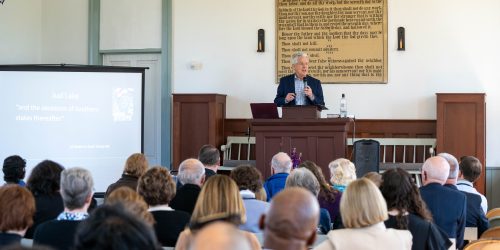
On Sabbath morning, Dwight Nelson, former longtime lead pastor of Pioneer Memorial Church on the campus of Andrews University, laid out a meticulous case by skillfully connecting Scripture, church pioneers, America’s problematic history and future. [All photos by Katie Fellows]
These were among the questions at the heart of the two-day Lake Union public affairs and religious liberty summit held April 5–6, 2024, at Battle Creek’s Historic Adventist Village, under the banner “Early Pioneers and Civic Engagement.”
On Sabbath morning, Dwight Nelson, former longtime lead pastor of Pioneer Memorial Church on the campus of Andrews University, laid out a meticulous case by skillfully connecting Scripture, church pioneers, America’s problematic history and future. As he stood in the pulpit of the second meeting house, the building where the name Seventh-day Adventist was selected in 1860 as the official name of the church, he shared three convictions on his heart: “Number one, we are living on the edge of eternity; number two, Jesus is coming soon; and number three, America is in trouble—big trouble.”
Last Thanksgiving, Nelson had some friends over for dinner and as the food was being passed, he asked his guests what they thought America would be like by next Thanksgiving? “The moment I say that there’s just this groan.” Why? “We are politically fractured. We are racially fractured. We are spiritually, socially, culturally fractured. We are fractured to the core.”
And this fracture springs forth from America’s history with slavery.
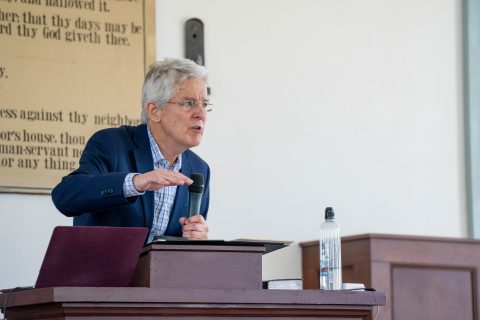
Three weeks ago, Nelson said he came across a discovery in Revelation 18. “Why hadn’t I seen this before?” he asked. The angel proceeds to warn of a fallen Babylon where no one will buy the merchandise. Verse 13 lists several commodities, including metals, precious stones, fine linens, fragrant oils, and ends with human beings sold as slaves. “Babylon has been dealing with the slavery of human souls,” he concluded.
He further described that Revelation 13 illustrates “America is in bed with Babylon.” One clue is the wounded dragon described in the Bible as having two horns like a lamb and speaking like a dragon. “I used to think, it’s a little lamby here and then it becomes like a dragon here,” he said. “Now I realize it was dragon from the beginning. This whole slavery wound is because it was dragon from the beginning.”

For those who think slavery is in the past, Nelson pointed out the root of slavery is still very much alive and well in America today. “Ever heard of Christian nationalism?” he asked. Christian nationalism is described as a growing movement of American evangelicals seeking to take control of American politics so they can advance their own political and spiritual agenda.
A survey conducted by the Public Research Institute and the Brookings Institute found that two thirds of white evangelicals supported or were sympathetic to Christian nationalism. They were in favor of the government declaring Christianity as the state religion and felt God has called Christians to exercise dominion over all areas of society. Nearly 90% of white adherents to Christian nationalism agreed that God intended America to be a new promised land run by European Christians. “That’s about as racial and racist as you can get,” Nelson asserted.
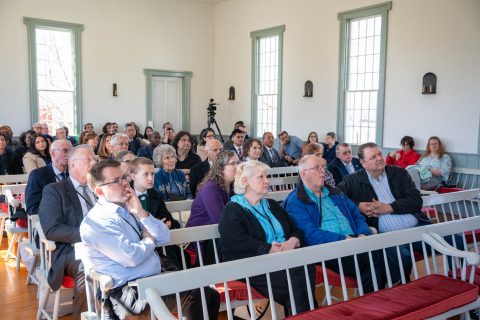
“God raised up America,” Nelson said, “but the founding fathers never intended to create a Christian nation. The fact of the matter is that God raised up this land to be a safe haven where church and state could be kept apart, where no king can rule the church and no pope can rule the nation.”
While Christian nationalism reflects a distorted image of Jesus, believers can’t afford to watch what’s happening around them in silence. “We have to reach America before they do,” he implored the audience. “What we do is find the people who are suffering, we find the disenfranchised, the marginalized, and the alienated. We find them and we love on ‘em.”
Nelson said it’s worth noting the early pioneers addressed the issues of their day head-on. General Conference president John Byington joined the anti-slavery society and was an agent in the underground railroad. Ellen White expressed outrage at the Fugitive Slave Act and asked fellow believers not to obey the unjust law. Joseph Bates, a sea captain, described America as a “heaven-daring, soul-destroying, slaveholding, neighbor-murdering country.” Meanwhile, Uriah Smith, editor of the Advent Review and Sabbath Herald, in 1862 called slavery “the whitewashed villainy of many of the pulpits of our land and the strenuous efforts put forth to foster and extend this diabolical system.” James White in the Review pointed out slavery is one of the darkest and most damning sins of this nation. Nelson stressed, “They weren’t afraid about writing this and publishing it for the whole America to read.”
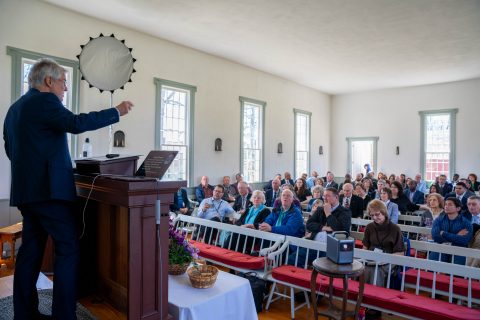
Speaking out for justice may have consequences and it may cost you your life, like Jesus on Calvary. “So what?” asked Nelson. “Why not die for something that’s worth dying for instead of living for the paltry visions and dreams that are dying on the vine in our own hearts and lives.
“This is the perfect chance for us and this union to model race, the ethnic groups, blacks, whites, browns, yellows, coming together to do the work together. This is our chance. This is our moment.”
The moment for Adventists to shine has been long in the making, according to Kevin Burton, director of the Center for Adventist Research located on the campus of Andrews University.
Burton’s hard-hitting expose on the activism of Adventist pioneers dovetailed Nelson’s presentation, despite neither of them knowing what the other was going to discuss in advance.
The issue of slavery could not be ignored, according to Burton. Between 1619 and 1865, an estimated 10 million slaves came to the United States. They contributed 410 billion hours of free labor.
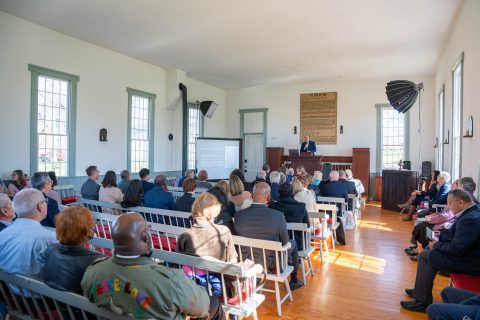
Many Christians were slaveholders, believing it was not a sin. Most of the U.S. population, many of them professed Christians, were silent on the issue. Their rationale, according to Burton, was that abolition was dividing the church, and they counseled members to “don’t get involved with politics, don’t jeopardize the mission of the church. Focus on saving souls.” Once slavery was abolished in 1865, the United States entered the Jim Crow era, which meant racial segregation.
In rapid-fire succession, Burton unleashed information detailing the pioneers’ refusal to remain silent and on the sidelines. They signed petitions to abolish slavery, dismantle the death penalty, and eradicate the ban on interracial marriage. They joined boycotts and pushed for Blacks to have the privilege to vote.
Burton outlined the rise in 1840 of a political party called the Liberty Party. The party had a platform of two items: immediate and complete abolition of slavery, and equal rights for Blacks. The party was comprised of 10% to 20% Adventists. “I think that number is fairly conservative since I’m basing it off one of the weaker states in the Liberal Party’s history,” Burton explained. Of note, several of the party’s leaders were Millerites, followers of William Miller, who sparked the beginnings of the Adventist church.
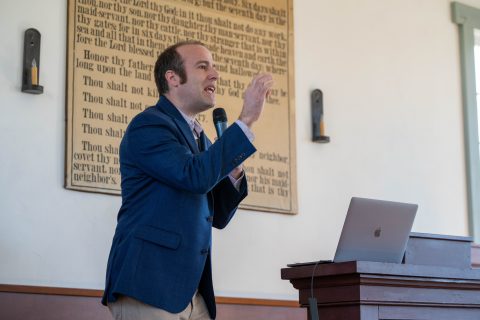
Early pioneers were very active in publishing and advocating to change racist policies, as they preached the second coming of Christ. They felt, said Burton, “if you believe Christ is coming soon, if you believe heaven is going to be an integrated place—which most Christians thought it would be segregated—then you better believe that and live that right now to prepare for the coming of Christ.”
This was also precisely the argument put forth by Michael Campbell, director of Archives, Statistics and Research at the North American Division. He said his extensive studies of the pioneers revealed they were active participants working with a sense of urgency. “One thing [that] kept continually coming through to me is that our pioneers did not just lackadaisically sit on the sidelines and see what happens around them,” he said. “They were active and involved in their world.”
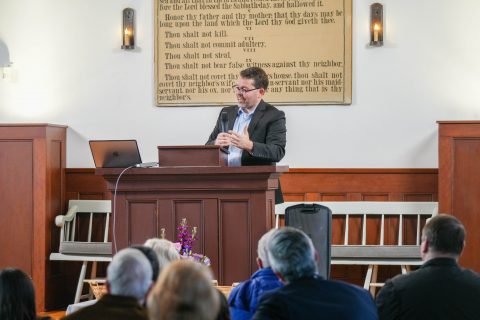
What was happening around them—the environment, signs in the heavens—presented opportunities to mingle and discuss the Bible with their neighbors. These early believers were also willing to travel to the ends of the earth to spread the gospel with a sense of zeal. A letter from James White in 1843 read, “God forbid that I should fold my arms in lazy lock while sinners are sinking to eternal night.”
For many members, their first impression of the Public Affairs and Religious Liberty Department of the church is one focused on Sabbath accommodation and religious liberty. But Orlan Johnson, PARL director for the North American Division, clarified that the “Public Affairs” side—letting the community know about Adventists—is just as critical. “If you do the public affairs in an effective way, religious liberty becomes easier to do,” he said.
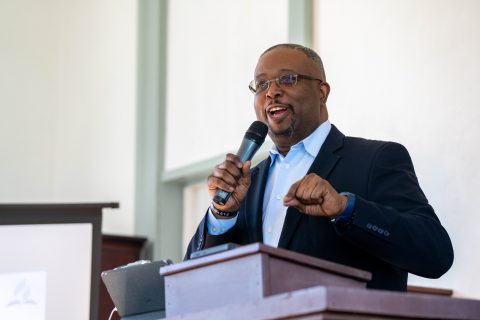
Public affairs means “making friends before we need them.” As we seek to win friends, he emphasized that our first act is to give. “Your first relationship cannot be to ask,” he counseled. “Your relationship has to be offering a gift. Establish yourself as a giver.”
To watch the full presentations, please visit lakeunionparl.org. More photos can be found on Flickr.
Debbie Michel is editor of the Lake Union Herald